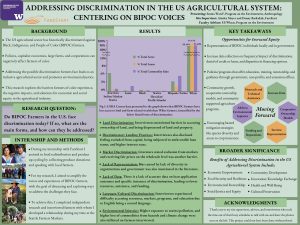DECOLONIZING STRUCTURAL RACISM IN THE US FOOD SYSTEM: CENTERING BIPOC VOICES
The US agricultural system has a history of discrimination towards Black, Indigenous, and People of Color (BIPOC) farmers, which has directly contributed to white and non-Latino farmers owning more land and generating more farm-related wealth than farmers of color at overwhelmingly high levels. For my research, I aimed to amplify the voices and experiences of BIPOC farmers, with the goal of discussing what challenges they face and exploring ways to address those challenges. During my internship with the food recovery nonprofit FareStart, I conducted interviews with local farmers with whom I developed a professional relationship, as well as carried out independent research. Addressing the types of discrimination farmers face today can lead to a more inclusive and diverse agricultural sector, promote environmental justice, and advance social equity in the US. According to my findings, owning or accessing land, discriminatory lending practices, hindrances to accessing or being excluded from markets, lack of representation, lack of data being available, language/cultural barriers, and environmental injustice are the most substantial factors contributing to BIPOC farmers’ discrimination. Moving forward, my findings show that outreach and technical assistance, addressing health disparities, increased funding/reparations, increased representation, more comprehensive data, as well as cooperative ownership models all have the potential to reverse systemic violence and disparities within the agricultural system.
